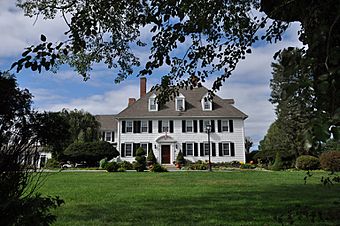Mathew Bowen Homestead facts for kids
Quick facts for kids |
|
|
Mathew Bowen Homestead
|
|
 |
|
| Location | 94 Plaine Hill Rd., Woodstock, Connecticut |
|---|---|
| Area | 14.3 acres (5.8 ha) |
| Built | 1816 |
| Architect | Truesdale, Walter; Fisher, Richard Arnold |
| Architectural style | Georgian, Federal, Federal Revival |
| NRHP reference No. | 87000859 |
| Added to NRHP | September 10, 1987 |
The Matthew Bowen Homestead, once known as the Plaine Hill Farm, is a historic house in Woodstock, Connecticut. You can find it at 94 Plaine Hill Road. Today, it is known as the Inn at Woodstock. This house was built in 1816. It is a great example of a farm home from the Federal period, which was an architectural style popular after the American Revolution. The house has a long history with the important Bowen family from the area. It was added to the National Register of Historic Places in 1987.
Exploring the Matthew Bowen Homestead
The Matthew Bowen Homestead sits on more than 14 acres (5.7 ha) of land. This is just west of where Plaine Hill Road meets Connecticut Route 169. The property includes five buildings that make up a farm complex. These buildings are located southwest of Woodstock Hill.
The main house is a large wooden building. It has 2-1/2 stories and is six bays wide. A "bay" is like a section of the house, often marked by a window. The house also has a tall hip roof, which slopes inward from all sides.
How the House Changed Over Time
The main house was built in 1816. Over the years, it was changed quite a bit. It started as five bays wide. In the 1880s, Victorian-style porches and a small tower (called a turret) were added.
However, most of these additions were removed in the late 1920s. At that time, the house was made even bigger, becoming six bays wide. The main house is connected to other farm buildings from the 1800s. These include two barns and a carriage house, which was used for horse-drawn vehicles. There is also a Cape-style house built in the 1930s, set a little distance from the main buildings.
The Bowen Family's Legacy
William Bowen built this farmhouse in 1816. Later members of the Bowen family made several changes and additions. For example, a carriage house was added around the time of the American Civil War.
In the 1880s, Henry Chandler Bowen made many big changes. He was a very important person who also owned the famous Roseland Cottage in Woodstock Hill. In 1929, the inside of the house was updated in a style called Federal Revival. This work also included building the nearby Cape house. The property remained a working farm until 1982. That's when it was sold and left the Bowen family after many years.



